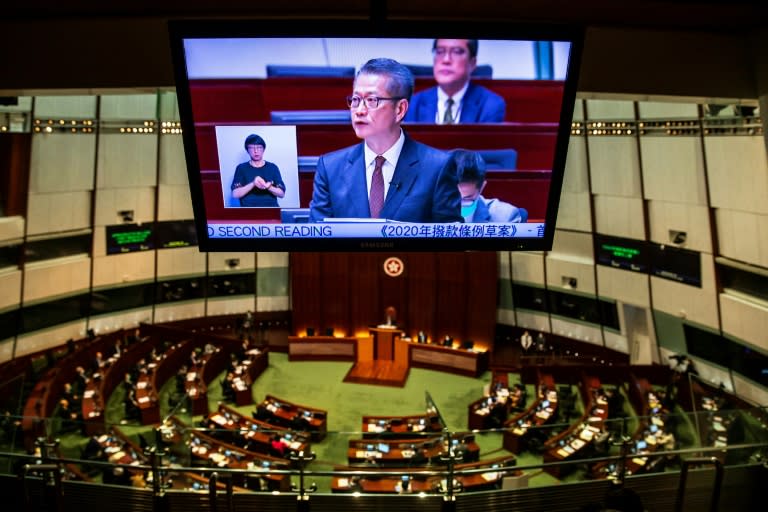Hong Kong shifts aim from the virus to property: Andy Mukherjee

By Andy Mukherjee
(Bloomberg Opinion) -- If the quantum of public spending alone decided the seriousness with which small, open Asian economies are fighting the coronavirus, then Hong Kong’s HK$120 billion ($15.4 billion) package ought to be three times punchier than rival Singapore’s.
When it comes to the quality of expenditure and the financing, though, Hong Kong’s plan seems to be less about protecting lives and livelihoods, and more about preserving the island’s frothy property market.
The centerpiece of Financial Secretary Paul Chan’s antidote is a HK$10,000 cash handout to all adult permanent residents. Additionally, Hong Kong will offer bigger income and profit tax rebates, and provide subsidies on utility bills as well as government guaranteed low-interest loans to small- and medium-size businesses. From cancelled orders and stuck payments to inventory pileups, SMEs may be worst-affected by the outbreak. Supporting them is necessary. But how reasonable is a handout for all?
The S$6.4 billion ($4.6 billion) anti-viral budget recently announced by Singapore also has a cash component. But for high-income earners and property owners without young children, it comes to just S$100 — less than HK$600. Although the needy and elderly will get more, the bulk of Singapore’s extra spending will support firms and shore up health expenditure.
Hong Kong, however, seems to be using the virus as an excuse to splash money: Almost 60% of its stimulus package is doing just that.
All told, the budget deficit for the fiscal year 2020-21 will balloon to HK$139 billion, or 4.8% of gross domestic product, up from about HK$38 billion for the current fiscal year.
The headline figures could be deceptive, though, considering that even this year’s deficit was largely a meaningless number. It included money set aside for a HK$30 billion anti-epidemic fund, which will only be used next fiscal year to give a one-time special allowance to low-income households and subsidies for students. Strip that out, and Hong Kong’s first budget shortfall in 15 years was basically an optical illusion.
Next year may be the same story. The four rounds of relief measures the city has announced since August to offset some of the economic impact of anti-government protests have already put some cash in people’s pockets. Soon the additional HK$10,000 checks will hit their bank accounts. If the virus gets contained in a few months, those with secure jobs may be encouraged to use the windfall to put a step on the city’s impossibly expensive property ladder.
And even if the monetary incentive is too small for them to do that, their landlords will know that they can ask for higher rents since every family of two permanent resident adults and their two school-going children will be getting a total of HK$27,000 in cash from the government and paying slightly lower taxes. Stable rental yield on existing properties will support new real-estate launches.
What the government earns from stamp duties — some of which are meant to keep housing prices in check — will rise. So will revenue from land sales to developers, especially when the city with some of the world’s least-affordable real estate starts hawking parcels under the controversial Lantau Tomorrow program. The 4.8% deficit could end up much lower, but long-term public finances would be that much more reliant on property prices.
It’s a dangerous addiction. In the first five years of the millennium, revenue from land premium and stamp duty together accounted for 13% of government revenue. Now they bring in a third. Profit tax still remains the single-biggest individual contributor, but even here there’s little broadening of the base. Property, investment, banking and finance, wholesale trade and import and export account for two-thirds of profit tax collections; nine out of 10 companies in Hong Kong pay nothing at all.
Every second employed worker shells out some income taxes, though with the 100% relief that Chan has announced (with the reduction capped at HK$20,000), even the base of the salary tax pyramid will become narrower.
Hong Kong doesn’t have Singapore’s consumption tax, or casino earnings. Singapore’s sovereign wealth fund and state investment arm are now the No. 1 contributor to its budget, whereas investment income has become a negligible part of Hong Kong’s public revenue over the years.
Given its long-term funding constraints, Hong Kong needs to be more prudent than to splurge indiscriminately. The cash it’s throwing around isn’t a protection against coronavirus. It will only stimulate what doesn’t need any more encouragement: the property market.
© 2020 Bloomberg L.P.

 Yahoo Finance
Yahoo Finance 